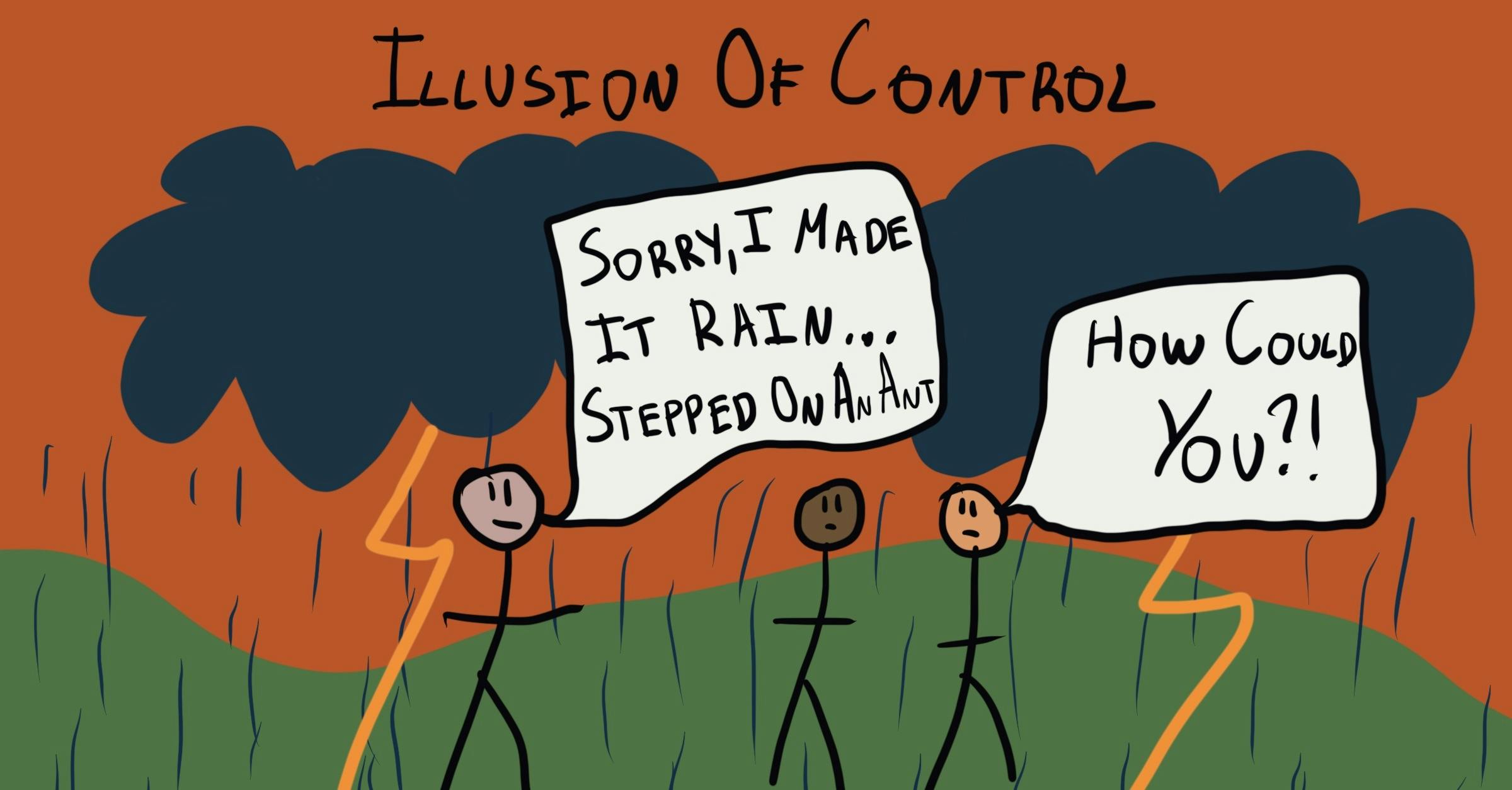Why do we think we have more control over the world than we do?
Illusion of Control
, explained.What is the Illusion of Control?
The illusion of control describes how we believe we have greater control over events than we actually do. Even when something is a matter of random chance, we often feel like we’re able to influence it in some way.

Where it occurs
You and your family are going to watch your favorite soccer team in the league championship match. As always, your dad wears his “lucky” jersey in the team’s colors. It’s a little small on him these days, but he insists on wearing it, because he thinks it will boost the team’s chances of winning.
Debias Your Organization
Most of us work & live in environments that aren’t optimized for solid decision-making. We work with organizations of all kinds to identify sources of cognitive bias & develop tailored solutions.
Individual effects
When we believe we have more influence over something than we really do, we might end up just choosing easy strategies to accomplish something, rather than thinking it through and anticipating problems that could come up. It can also lead us to pin our hopes on superstition and magical thinking, when the reality is that these things aren’t going to change our situation.
Systemic effects
Any time we are encouraged to feel like we have more control over an event than we actually do, we’re at risk of making bad decisions. This can contribute to a number of harmful behaviors. One example of this is gambling addiction. People who keep gambling, even when they’ve already lost large amounts of money, do so in part because they believe on some level that they have special skills or knowledge that will help them eventually win big.1
Why it happens
We like to think of ourselves as rational decision-makers, carefully making choices based on data and logic. The illusion of control is one of many cognitive biases that throws a wrench into this idea. This illusion crops up in cases where something is very clearly random, such as the lottery, and in situations where we obviously do not have any effect on the outcome, such as sports matches. And yet, we are very susceptible to feeling like we do have some influence.
“The illusion of control” was coined by Ellen Langer, a Harvard psychologist. In her original paper, she conducted six different experiments to see where and when this bias would appear.2 In each experiment, participants had to participate in some sort of game that was governed by chance, including cutting cards and entering a lottery.
Langer found that people’s confidence in their chances of winning was influenced by a bunch of different factors—none of which actually had anything to do with their chances of winning. People bet more money when they were cutting cards against someone who seemed awkward and unconfident, even though skill didn’t matter in this game; they assigned a higher value to lottery tickets they had picked themselves, suggesting they believed these tickets were more likely to win; and they became more confident in their odds of winning a lottery they more time they spent thinking about it.
In short, there are a lot of things that can trigger the illusion of control. But why are we vulnerable to it in the first place?
It satisfies our need to be in control
Over the years, a lot of research has shown that we experience things very differently depending on whether or not we feel like we have control over them. One classic study illustrating this was conducted in 1971 by Glass and colleagues. In this experiment, the researchers told participants that they were doing a study on “the effects of different noise levels on your performance on some simple tasks,” and then made them proofread passages while a highly annoying buzzer sounded at random intervals in the background.
Some of the participants, the “Perceived Control” group (PC), were given a button they could push to communicate that they wanted the noise to stop (although the experimenters made it clear that “we’d prefer that you do not”). Meanwhile, people in the “No Perceived Control” group (NPC) weren’t given an out if they didn’t like the noise; they just had to sit through it, for 24 minutes. Also, during the experiment, participants were hooked up to a machine that measured their galvanic skin response—basically, how much they were sweating. This is often used in psychology research as a measure of how stressed somebody is.
The researchers found that, although pretty much everybody got used to the noise by the end of the experiment, the NPC group was more stressed out by the noise for a longer period of time, compared to the group that had the option of terminating the noise. They were also less efficient at proofreading. An important thing to note here is that this happened even though nobody in the PC group actually pressed the button to stop the noise. When we’re in an unpleasant situation, just knowing that we could stop it makes it much easier for us to tolerate it.
Believing that we are in control of what happens to us, even if that’s not always completely true, is actually an important part of our mental health in general. The opposite of the illusion of control is learned helplessness, which describes how, if people have previously been put in situations where they were powerless to change anything, they start to feel like they lack control over their own lives. This makes them quicker to give up when they are faced with obstacles. Unsurprisingly, learned helplessness is a cornerstone of depression.4
We are optimists to a fault
On the whole, people have a bias towards positivity,5 an effect that is referred to as optimism bias, or sometimes as the “Pollyanna principle.” We are optimistic about the world in general, and about ourselves.6 This bias runs so deeply that it actually affects our perception of the world, and the ways we think and focus our attention. We are more attentive to positive information than negative; we are more likely to remember happy events than sad ones; and, when it comes to making decisions, we have a habit of weighting optimistic predictions more heavily than pessimistic ones. This optimism bias most likely contributes to the illusion of control: we want to believe that things will turn out well for us, even if this is unrealistic.
We see causality where there is none
Our brains are wired to come up with causal explanations for things, even if this isn’t justified. This fuels the illusion of control by leading us to interpret things that happen to us as being consequences of something that we did, when in fact, some of the time, we had nothing to do with them.
Daniel Kahneman, one of the most influential figures in behavioral economics, talks about this tendency in his book, Thinking, Fast and Slow. This book is primarily dedicated to explaining the two different systems that contribute to our thinking: System 1, which is automatic and outside of our control, and System 2, which we are consciously aware of and is involved in more effortful processing.7 According to Kahneman, the task of coming up with causal explanations for events is handled by System 1. This means that we tend to come to conclusions about why things happen without reasoning through it.
To illustrate this, consider this sentence:
“After spending a day exploring beautiful sights in the crowded streets of New York, Jane discovered that her wallet was missing.”8
When you read this, you probably infer that Jane has had her wallet stolen while she was wandering around New York City. In fact, when researchers showed people this sentence and were then given a surprise memory test, people associated the word pickpocket more strongly with the story than they did the word sights—even though sights actually appears in the story, while pickpocket does not.
In theory, Jane could have lost her wallet any number of ways—for example, by dropping it somewhere. But because the first part of the sentence mentions crowds and New York, we are primed to come up with a causal explanation that relates to these things. With the illusion of control, the same principle applies: if we do action X and end up with outcome Y, System 1 might lead us to assume that X caused Y.
Why it is important
The illusion of control can encourage us to make irrational decisions, leading to negative outcomes that could have been easily avoided. Gambling is a prime example: even in cases where everything is completely up to chance, people often feel like they can shift the odds in their favor, by using the right “strategy” or going through certain rituals.
This bias is often exploited in advertising for casinos and other companies that rely on gambling behavior. On top of downplaying the risks of gambling, marketers try to enhance people’s perception of control over betting games. One study on sports betting advertising in the UK found that these ads commonly played up themes of masculinity and sport knowledge, in order to construct a narrative: that men who are macho and sport-savvy have a better chance of winning money.9
Even if you’re not much of a card shark, we are all still susceptible to the illusion of control—especially when we are in certain types of situations. Research has shown that stressful environments encourage the illusion of control, as are environments that are highly competitive. This bias is also more likely to crop up when we adopt an implemental mindset, meaning when we focus solely on accomplishing a goal, rather than reflecting more deeply on all the potential outcomes of our actions.
And where the illusion of control does rear its head, it can cause us to do a worse job. In one study on financial trading—a job that is stressful, competitive, and encourages people to focus on maximizing profits in the short term—the more traders fell for the illusion of control, the worse they performed at their job.10
How to avoid it
Falling for the illusion of control isn’t a matter of intelligence or personality. Even scientists are prone to this bias in their daily lives, using intuition to make judgments about the reasons for something that has happened.11 Avoiding the illusion of control means deliberately choosing not to just follow your gut when making a decision. Instead, there are a few strategies that are likely to lead to better outcomes.
Take the outside view
When we’re making any decision, it’s a good idea to turn to external sources of information, rather than relying just on our instincts. In many cases when we need to predict how likely we are to succeed at something, there might be hard data available that we can use to temper our expectations. This has been referred to as taking the “outside view.”12
If you’re deciding to enter the lottery, for example, you might intuitively feel like you have a not-insignificant chance of winning, especially if you use a certain number—but a quick Google search will tell you that in reality, the odds of winning certain games are approximately 1 in 14 million.13 Even when no data is available, it’s useful to get a second opinion, ideally from somebody who isn’t invested in the decision that you’re making.
Think like a scientist
No, scientists aren’t immune to the illusion of control—but still, employing the methods of science is the best way to assess whether or not something really has a causal relationship with something else. Think of scientific methods as a type of tool: just as you wouldn’t try to figure out how much something weighs without using a scale, you also shouldn’t be trying to assign causality without first trying to think about them critically.11
If you’re not familiar with the scientific method, educate yourself on the basic ideas, and try applying them in your daily life. If your goal is to help somebody else to avoid the illusion of control, you might be most successful if you start out by getting a little sneaky.
One study that successfully reduced the illusion of control in teenagers started out by telling them that a piece of ferrite, a type of ceramic material, was a “miracle product” that could improve their physical and cognitive abilities. The researchers then let the group play around with the ferrite, to “test out” its various benefits. It was only after the group was convinced that the ferrite was effective that they were informed it was useless, and then educated about better ways to judge causality. Showing people how their own thinking can be fallible is a powerful way to get them on board with more scientific methods.11
How it all started
Ellen Langer first coined the term “illusion of control” in the 1970s. Prior to her research, other studies had established that people have a tendency to see causal relationships in places they don’t actually exist. This type of phenomenon is broadly known as an illusion of causality. The illusion of control is a specific type of causal illusion.
Another important concept that laid the groundwork for Langer’s research is the “just world” hypothesis, which essentially describes how people tend to believe that life is fair. It’s similar to the concept of karma: we want to believe that good things happen to people who do good things, and bad things happen to people who do bad things. As with the illusion of control and other causal illusions, the just world hypothesis involves inventing causal explanations for events, without necessarily applying reason or logic to them.
Example 1 - the "close door" button
If you’ve ever felt like the “close door” button in an elevator wasn’t actually doing anything, you’d be right (at least if you’re in the U.S.). After the Americans With Disabilities Act was passed in 1990, the law required that elevator doors remain open long enough for people using crutches, a cane, or a wheelchair to safely get on board. And in certain places, such as New York, the same applies to crosswalk buttons: most of these have long since been deactivated, in favour of using computer-controlled traffic signals.14
Why keep the buttons around if they don’t do anything? Even though they’re useless, being able to push a button to get what we want plays into the illusion of control, and makes us feel better about having to wait. Just like in the noise study above, as long as we perceive we have control, we’re better equipped to deal with annoyances and obstacles.
Example 2 - Homeopathy
The illusion of control is often associated with superstition and paranormal beliefs,15 both of which have been on the rise in recent years. Another thing this bias contributes to is the belief in homeopathy, or alternative medicine.11 As of 2019, homeopathy was a $1.2 billion industry in the U.S. alone, with analysts projecting its global market to grow by 12.5% by 2023. And although homeopathic remedies were once thought of as a “hippie” thing, today, they’re becoming mainstream, with leading brands available at major retailers including Whole Foods and Walmart.16
This trend is troubling, given that homeopathic products are not FDA-approved, nor are they based on scientific evidence. Although homeopathy usually isn’t harmful in and of itself, there’s a risk that consumers will choose these remedies over medicine that’s proven to be effective, believing they have found a better alternative to mainstream medicine.
Summary
What it is
The illusion of control is the tendency for people to believe that they have more control over things than they really do. This leads us to overestimate our odds of succeeding or getting a positive outcome, and to invent explanations linking our behavior to some result.
Why it happens
We are prone to this bias because we have a psychological need to feel like we’re in control, as well as an overall bias towards optimism. Our automatic thinking processes also tend to see causality between events, even if they’re not actually connected.
Example 1 - Elevators and crosswalks
Both the “close door” buttons in elevators and the buttons at many crosswalks (especially in New York) are “placebos”: they don’t actually do anything. However, because they make people feel like they can influence things around them, they remain.
Example 2 - Homeopathy
Homeopathic medicine is not scientifically proven or FDA-approved, but it is becoming increasingly mainstream. Research has tied beliefs in homeopathic, as well as superstitious thinking and paranormal beliefs, to the illusion of control.
How to avoid it
The best way around the illusion of control is to educate yourself in the scientific method, and apply this to situations where you’re tempted to follow your gut. It’s also good to seek out other opinions.
Related resources
Why We View Gambles As Certainties
The article looks at the growing online gambling industry, and the state of the psychological research on why people gamble. There’s at least one online betting company, Pinnacle, that offers “genuinely useful guides” on various cognitive biases that lead to irrational behavior, including the illusion of control. In spite of this, their business has continued to grow, making it clear that education isn’t enough to deter people. So what can be done? Some possible solutions are discussed.

